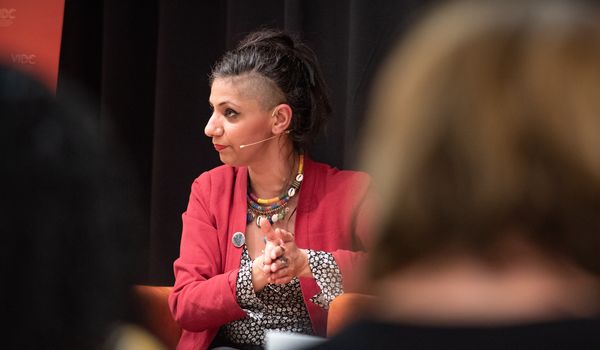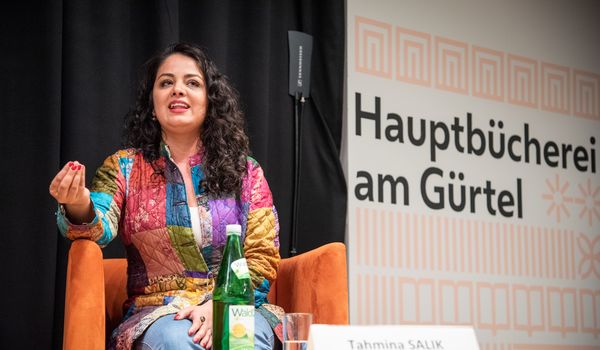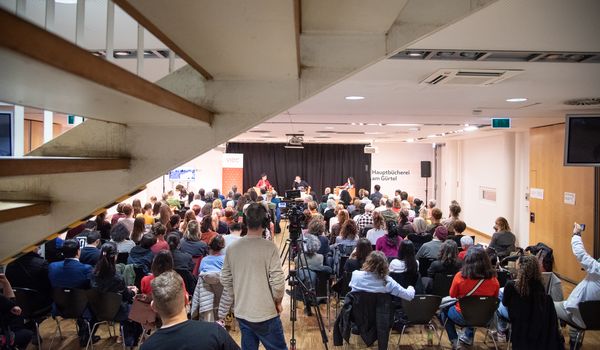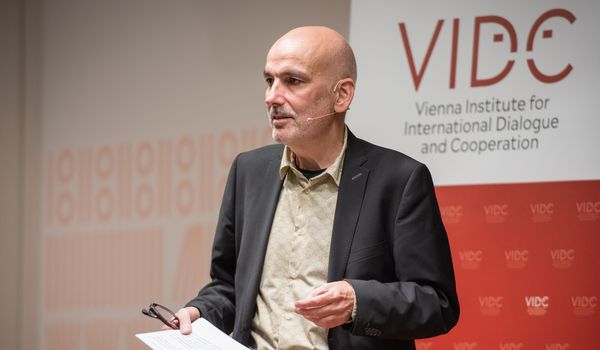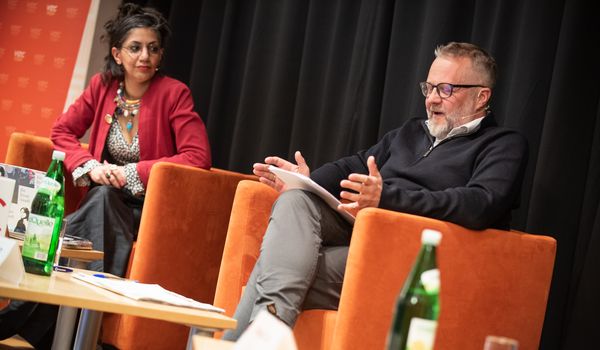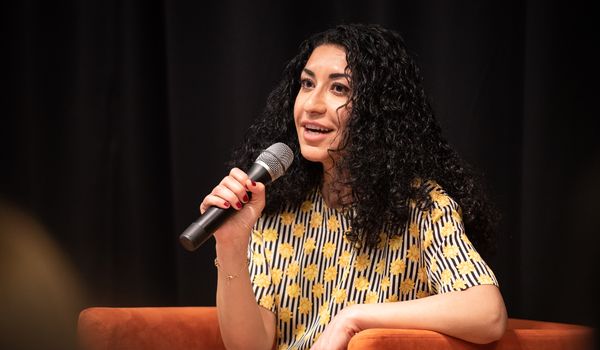Women have recently taken the lead in protest movements in Afghanistan and Iran, displaying incredible bravery and resilience in the face of hardship and adversity. The oppressive, brutal, and authoritarian regimes that have limited women’s access to social and political freedom, employment opportunities, and education are the common enemies of the protesters in these neighboring nations. The protesters are demanding equal rights and opportunities for women, and they believe that the only way to achieve this is by overthrowing these oppressive regimes and replacing them with democratic governments that respect human rights. They are also calling for international support and solidarity in their struggles for freedom and equality.
In both Afghanistan and Iran, the situation of women is dire and requires urgent action to protect them. VIDC therefore organized an event on April 27th 2023 at the Vienna Main Library, which focused on the plight of Afghan and Iranian women and on their struggle for rights and freedoms. VIDC invited the Iranian artist and journalist Mina Khani and a representative of the Danish Afghan Women Diaspora Forum Tahmina Salik to Vienna. Education activist Parasto Hakim, currently living in Paris, and underground women’s rights activist Mozhgan Keshavarz spoke via remote connection about their struggle against oppressive regimes and their fight for women’s rights.
Fighting Gender Apartheid in Iran
In Iran and Afghanistan, women have taken to the streets in protest against oppressive governments in these countries. In the Islamic Republic of Iran, the protest against the compulsory wearing of the Hijab has become a focal point. According to Khani, violators of Iran’s Hijab law risk being detained, tortured, or even killed. In September 2022, the death of Mahsa Jina Amini, a Kurdish woman who was beaten to death in police custody after being detained for not donning the Hijab, gave the protest movements more traction. Across the nation, protests erupted in response to her death, and men cheered the women who removed their Hijabs at Amini’s funeral. According to Khani, this act of defiance served as a potent symbol of the growing opposition to the oppressive policies of the regime. Khani asserted that the struggle against the Hijab is not just about women’s rights but a struggle for freedom and democracy for all Iranian citizens. The state’s attempt to control its citizens through dress codes and other measures is a violation of human rights and must be challenged. “Iran wants to control the population because it will allow the government to exert direct political control over them. The government wants to do this all the time and everywhere,” Khani said.
In Iran, women and younger generations have dominated the protest movement against mandatory Hijab. The protest is also about standing up against an authoritarian regime that has been in power since 1979. The women’s movement gained even more international attention when three women burned their Hijab in public, and it has since evolved to include men and members of the LGBTQIA+ community. Khani emphasized that the protest was about standing up for individual freedom, human rights, and democracy. It is about challenging an oppressive regime and creating a better future for Iran.
Fighting Gender Apartheid in Afghanistan
In neighboring Afghanistan, the Taliban banned women from education, employment, and participation in public life. During the debate, Parasto Hakim provided an overview of the situation of the Afghan women’s protest movement and the restrictions imposed on women’s liberties. She stated that in her country, women cannot go to school, universities, work, or speak freely. They lack freedom in their outfits and the right to choose their partners. Women are forced into child marriages, and many give birth at a young age while they are still children themselves. Hakim also said that the Taliban established madrassah (religious schools) to promote radicalism, which would eventually lead to the collapse of the education system in Afghanistan. Since the Taliban’s return to power in August 2021, “Women have been facing gender apartheid,” Hakim said.
Hakim runs an underground school to provide education to those who cannot attend school due to Taliban restrictions. Her school aims to give teachers and students the same experience as they would have in a proper school but in a more secretive way. “We have managed to evade their [Taliban] attention by changing our location whenever they show up,” Hakim answered, in response to a question about how she copes with the ban on education by the Taliban.
Since their return to power, Afghan women have demonstrated against the ban in various provinces, but their demonstrations have been crushed by the Taliban. According to Tahmina Salik, the Taliban has been successful in suppressing women’s protests by using imprisonment and torturing many women who participate in peaceful demonstrations. However, these women continue to use social media and other means to share their messages and raise their voices, even if it means remaining anonymous. “They know what human rights are, what women’s rights are, and what freedom is. No amount of torture can take that knowledge away from the Afghan women,” Salik said.
The Taliban’s misogynistic policies harm Afghan women, according to Amina J. Mohammed, the United Nations (UN) deputy secretary-general, who stated in April that the UN will meet on May 1st to discuss recognizing the Taliban. On May 2nd, following the conclusion of the UN-organized meeting in Doha, Antonio Gutierrez, the secretary-general of the UN, stated in a press conference that the gathering “was about developing a common international approach, not about recognizing the de facto Taliban authorities.” The Afghan diaspora and human rights organizations both responded negatively to Mohammed’s remarks, accusing the Taliban of virtually eradicating women from Afghan politics and society. Recognizing the Taliban without ensuring the protection of women’s rights would be a grave mistake. Hakim emphasized that the UN should prioritize the security and well-being of Afghan women over “whitewashing the Taliban” in any discussions or negotiations with the Taliban.
Hope for Afghanistan and Iran
According to Salik, there is still hope in Afghanistan, despite the Taliban’s attempts to restrict the rights of women and other minorities. Salik stated that the younger generation is fiercely committed to speaking out and working toward a better future. Thanks to social media, they are more connected than ever and strive for a better future. Salik argued that the Iranian and Afghan diasporas should use whatever platforms they have at their disposal to support the voices of women in their respective countries, despite the fact that the international community has abandoned Afghanistan. She also requested that the Afghan and Iranian women’s diaspora post pictures of gatherings and public speaking on social media to help the women inside Afghanistan and Iran feel less alone and to show that the diaspora will not be silenced.
Hakim is angry that a few men decide how certain situations affect women. She asserted that men do not understand what gender apartheid is. She makes a plea to the international community to assist Afghan women protesters and provide them with professional and technical assistance so they can combat the Taliban without resorting to violence. Hakim pleaded with everyone to support the Afghan women. According to her, “We need the world to be our voice and stand with us against the Taliban.” It is important to remember that the Taliban are still the same group, despite claims to the contrary. They have proudly taken responsibility for suicide bombings directed at journalists, minorities, women, and students. The panelists argued that it was a mistake to recognize the Taliban as a legitimate government.
As in Afghanistan, social media has also allowed young people in Iran to communicate with each other and with the rest of the world. According to Khani, there is no simple solution to Iran’s problems. The current solution seems to be token sanctions. Khani also believes that sanctions should be targeted at specific people rather than being part of general packages that cover everyone, including the Iranian diaspora. The West needs to come up with a plan to deal with Iran’s diverse opposition, which includes democratic and fascist ideologies, leftist and nationalist viewpoints, and various schools of Islamist thought. These opposing movements cannot act like they are one and must be open and truthful about their diversity. It would then be easier for the West to decide whether to support the democratic opposition and the women’s movement or to go back to autocratic leaders.




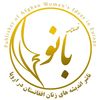
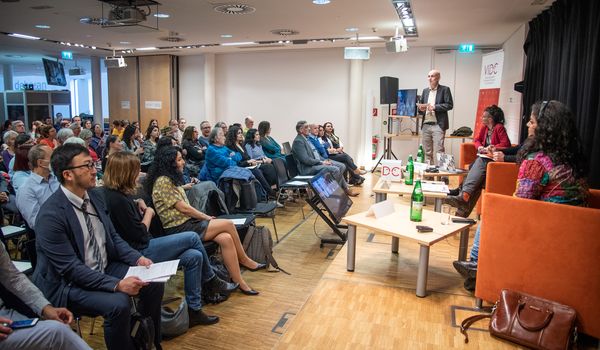
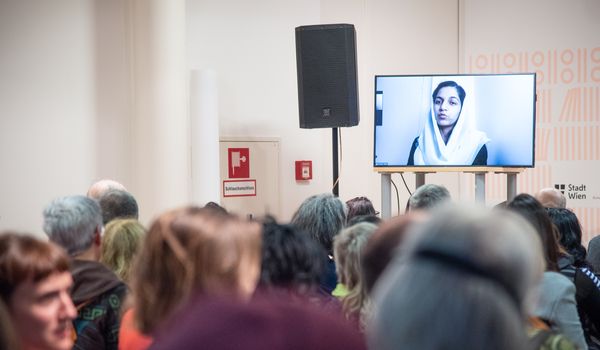
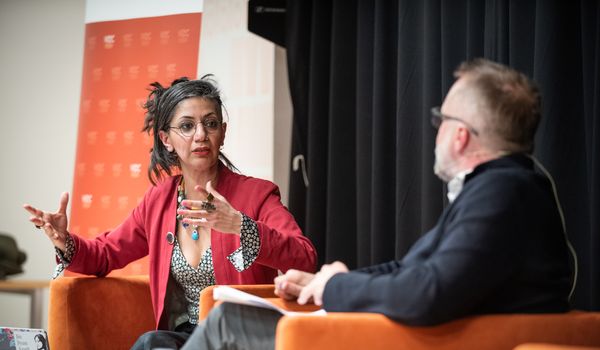
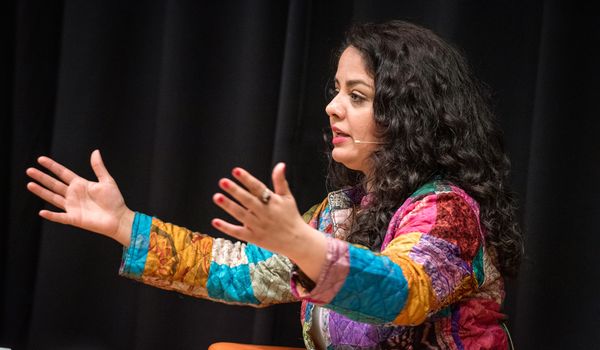
![[Translate to English:] Mozhgan Keshavarz © OXUS TV Mozhgan Keshavarz © OXUS TV](https://www.vidc.org/fileadmin/michael/iran_afghanistan/keshavarz.jpg)
